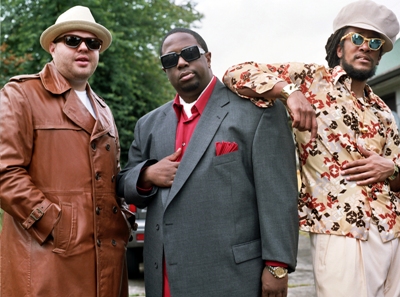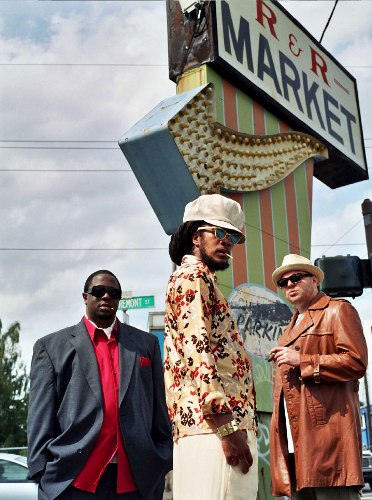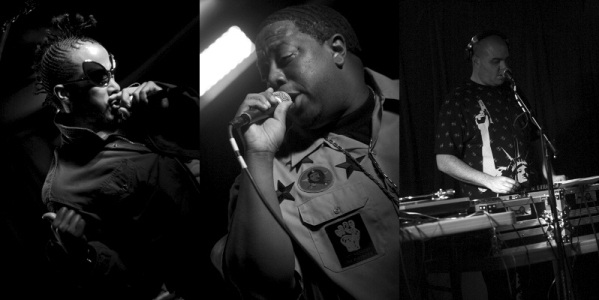
Lifesavas is the first Quannum rap act that wasn’t part of Solesides, a seminal Bay Area crew whose pivotal releases, from Latyrx’s The Album to DJ Shadow’s genre-defining “Entropy,” helped define 90s underground hip-hop. Signed to the label in 2001, the Portland-based trio seemed an unlikely candidate to mark the next wave of Quannum development. But the crew quickly distinguished itself with a series of 12-inches, beginning with 2001Â’s “Head Exercise”; and then a solid debut album, 2003Â’s Spirit in Stone.
Lifesavas’ second album, Gutterfly: The Original Soundtrack, follows nearly four years of silence. Its guest list alone — Camp Lo, Butterfly from Digable Planets, Fishbone, George Clinton, Smif ‘n’ Wessun, Don Blackman, dead prez and Vernon Reid — demands that the trio be taken as a leading light of non-mainstream rap dialectics. But the music cuts deeper than a facile all-star project. Religious imagery, allusions to blaxploitation-era heroics and a strong moral clarity help make their sophomore effort a remarkable excursion.
Lifesavas is rapper Vursatyl, rapper/producer Jumbo the Garbageman and DJ Rev. Shines. I caught up with Vursatyl for a phone interview as he and his crew headed to Missoula, Montana for a concert that night. Lifesavas is currently on a two-month tour; Gutterfly hit streets on April 24.
Left to right: Rev. Shines, Vursatyl, Jumbo the Garbageman.
Color images provided by Audible Treats.
B&W images by Michael Alan Goldberg.
For more on Lifesavas, visit:
Plug One Review: Lifesavas, Gutterfly: The Original Soundtrack
Plug One News: Lifesavas spread “Gutterfly” across America

Plug One: For those who haven’t heard the album, can you explain what Gutterfly is about?
Vursatyl: Gutterfly is a soundtrack. The idea is that it’s a soundtrack to a movie that never got made. The soundtrack would act as an end to tell the story of this movie, as well as still be a good Lifesavas album.
Gutterfly means coming from nothing from something, and the metamorphosis of us growing into our artists at this point in our career.
Plug One: What’s the story of the movie that never got made?
Vursatyl: The story is that we created this entire movie that even includes the creation of the story. We created a character, Baraka Feldman, that had a dream to make this movie called Gutterfly, and the movie script got burnt up in a fire, and all that remains is some of his notes. In the story, the notes and information get passed on to Jumbo, myself and Rev. Shines; and his dreams will be realized through us making the soundtrack.
The concept of the movie is that there are three guys trying to take down the villain in the movie. His name is Pharaoh, and he has five daughters that are assassins. We’re trying to take them down and gain control of Razorblade City.
Plug One: A lot of that stuff that you just described isn’t really on the album, right?
Vursatyl: Yes, there’s conversation and mention of all those characters through the songs and interludes.
Plug One: One of the songs that stood out to me was “Take Me Away,” which is almost like a religious song. It talks about being faithful to God. Was that an idea that you wanted to express overtly, or something that people could pick up on if they happened to notice it?
Vursatyl: The goal for us with “Take Me Away” … Â… The song and the beat felt like something that would put you on an excursion. So it’s really about escapism. But there are spiritual connotations. We were just expressing ourselves and hopefully we gave people food for thought. There is a line in the song saying, “We’re all trying to find God/But why, he ain’t hiding.” So it’s just food for thought to say, maybe what you’re looking for is right in your face. You’ve got to open your mind and find it. And whatever that means for everybody in terms of their spirituality, so be it.
Plug One: I noticed other types of imagery, too. There was “A Serpent’s Love” and “Superburn.” There seemed to be several songs that relate to the Bible, God and Jesus Christ.
Vursatyl: We’re spiritual cats, ya dig? You know, Jumbo and myself. Lifesavas is a group. It’s not a platform for that, but that’s always going to come out in our music because of our faith. Because of our individual faith, those things are going to come out.
We wanted to deal with stuff that was real, that we were going through and that we saw, even though we’re doing it through the concept of this album and through this soundtrack. So with “A Serpent’s Love” and other songs, that spirituality is true to who we are. Our faith is really important to us, so that’s always going to be depicted in the music.

Plug One: Do you see Lifesavas as a religious group and a Christian rap group, or is it just a hip-hop group?
Vursatyl: We’re just a hip-hop group. We all don’t comply with the same belief system. We have Rev. Shines in the group, and he has his own outlook and view. We don’t want to make the group something that’ll put any of us in a box. But again, our faith is important to us. But the group itself is just a vehicle to make great music.
Plug One: Can you describe the different belief systems among each three of you?
Vursatyl: Specifically, for me, I’m a Baptist kid. I was raised in the church. My father is a bishop. I’m actually still really active in my church, and with the youth, and in every aspect of my faith. As for Jumbo and Shines, again, very spiritual cats, but they’re free spirited guys. We just have to allow everybody to pursue their own path. That’s as much as I probably want to get into it.
Plug One: I know that, as a hip-hop group, your goal is to make good hip-hop music. But just the fact that you’ve come up with two very conceptual albums leads me to ask, what are some of your goals as a group beyond just making good hip-hop music? Do you have artistic goals that you’re trying to achieve? Are you trying to reach a commercial plateau? What are your goals beyond the music?
Vursatyl: It’s all encompassing. First and foremost, the goal is to try to make classic music and timeless music. But yeah, obviously we want to spark creativity among the new generation of artists, and maintain the perspective of what hip-hop is and how greatly that impacted us in terms of our creativity. We deal with a lot of social issues in terms of our community, so we try to encourage activism and encourage people to use their voice to stand for something, to believe in something, and not be afraid to fight for what they believe. From Spirit in Stone to now, there are spiritual messages to encourage people to find their spirituality, to know their God, and to be passionate about that. We like to have fun. We crack jokes on the record with skits like [Spirit in Stone‘s] “Thuggity Skit.”
So it’s about us encouraging people to find themselves, be individuals and be creative thinkers. We try to approach all those platforms, and if we can accomplish any one of those goals, we feel like the mission is complete.
Plug One: What’s the Portland hip-hop scene like?
Vursatyl: Portland has an incredible hip-hop scene. We’ve always had an incredible hip-hop scene. We have a long legacy of DJs, B-boys, graffiti artists and of course MCs. Since Lifesavas signed to Quannum, it’s no coincidence that light is being shed on the scene. So you’ve got artists that are putting out albums on other independent labels like Ubiquity and Rhymesayers. So now the world is getting a chance to hear and see Portland hip-hop. Groups like Grayskul, Ohmega Watts, Cool Nutz, Boom Bap Project — we’re tightly entwined between Seattle and Portland, so when we say Portland hip-hop we mean Northwest hip-hop — there’s Vitamin D, Jake One. It’s a good time for our scene as a whole.
Plug One: Is there a big difference between Portland hip-hop and Seattle hip-hop?
Vursatyl: I think there are differences. Â… But I think, more than the differences, there are a lot of similarities in that Seattle and Portland are both areas where there’s just such a wide reception for styles of music, from the grunge scene and rock scene in Seattle. You also have the indie-rock scene in Portland.
You know, New York got put into a box for a certain sound, and when people say West Coast music they’re really summing that up to Los Angeles. But with Portland, you can find gangsta rap, you can find conscious hip-hop, you can find Christian rappers or religious hip-hop, you can find Gothic hip-hop that’s a real Dungeons & Dragons-styled approach to the music. There’s a lot of variety in terms of our hip-hop scene.
In Seattle and Portland, you see that same approach to the music and that same reception to the variety. I think that’s what makes the two scenes so similar. They’re both very vast.
Plug One: Are you involved with the rock scene?
Vursatyl: I guess we are to some degree. We’re really close with a group called the Decemberists from Portland. They’re a rock group that’s doing really well right now. We make little cameos in their video shoots. We work on side projects together with a couple of the members of the Decemberists as well.
We got offered the opportunity to be a part of a tribute to a legendary Portland musician named Elliott Smith. So we’re one of the hip-hop groups that are not afraid to do a little cross-genre collaborations.
Plug One: Has the Elliott Smith tribute album come out yet?
Vursatyl: I believe it came out several months ago, probably about six months ago. [The album, To: Elliott From: Portland, came out in early 2006.] We made an interpretation of a song called “Happiness” on the album. We got a tremendous response from it. People seemed to really dig it.
Plug One: I’m curious about the projects with the Decemberists. Has any of that stuff dropped yet?
Vursatyl: No. In terms of the side projects Â… the guitarist from the Decemberists, his name is Chris Funk, he’s a steel guitarist. Chris Funk and Rev. Shines have formed a group called Knock-Knock. I’m doing some vocals for that project. So we’re all really good friends with Chris. We’re working loosely on those projects. Then there’s talk of doing this kind of ska joint between Lifesavas and Decemberists.
So we’re gradually piecing it together. With our touring schedules, it’s hard to make it crack. But in the next year, you’ll probably see a song where Decemberists and Lifesavas come together.
Plug One: How is the relationship with Quannum?
Vursatyl: It’s great, man. Quannum, those are our family members, y’know. First and foremost, Chief Xcel, that’s my brother. It’s like, it goes beyond music. That’s something that’ll be intact after the music is done.

